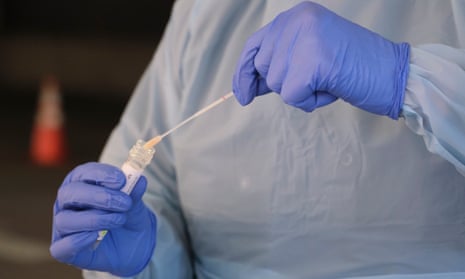The Lummi nation, a sovereign Native American tribe in the Pacific north-west, will soon open a pioneering field hospital to treat coronavirus patients, as part of a wave of strong public health measures which have gone further than many governments.
Tribal leaders have been preparing for Covid-19 since the virus first appeared in Wuhan, China, in late 2019, with medical staff beefing up emergency plans, reorganizing services and gathering medical supplies, including test kits and personal protective equipment.
The Lummi reservation is located in Whatcom county – 115 miles north of Seattle, Washington, where the first US Covid-19 case was confirmed in January, followed by the first death in February.
So far, the tribe has reported three Covid-19 cases, but expect numbers to rise as the pandemic progresses.
“We quickly recognised the need to make sacrifices for the greater good, in order to protect our people and the wider community,” said Dr Dakotah Lane, medical director of the tribal health service, who is in strict self-quarantine after coming into contact with a Covid-19 patient.
As the Trump administration stalled, the tribe swiftly introduced mitigation and prevention measures such as social distancing, drive-through testing, telemedicine clinics, and a home delivery service for the elderly.
The tribal council declared a state of emergency on 3 March – 10 days before Donald Trump did the same in the US – and approved $1m to prepare and respond for the evolving pandemic, which includes setting up the hospital.
A community fitness centre, located next to the tribe’s health clinic, has been repurposed into a makeshift hospital, with beds, protective gear and other essential equipment in place. It will open once the pharmacy is fully stocked. The 20-bed hospital will treat less critical inpatients, in order to free up intensive care units in nearby facilities, and prioritize Native Americans from any tribe.
“Our unique approach has piqued a lot of state and federal interest, we’re offering them a different model which shows that tribes are part of the solution in recovery efforts,” said the tribal chairman, Lawrence Solomon. “No private organization is going to try what we’re doing.”
The tribe’s proactive response to the evolving global pandemic has been possible thanks to vast improvements to the quality and capacity of its community healthcare system over the past decade.
Like an increasing number of tribes, the Lummi nation has opted for “self-determination” which enables greater financial flexibility and clinical autonomy – as opposed to depending on the federally controlled Indian Health Service (IHS) which has suffered decades of severe underfunding.
As a result, the Lummi health services raises substantial revenue by treating patients on Medicaid and Medicare – the third party billing program created by President Obama in 2010. This extra cash has allowed them to invest in infrastructure and build capacity: the tribe now has eight doctors compared with just three in 2013, including three physicians with public health expertise.
CDC modeling suggests that anywhere between 2.4 million and 21 million people in the US could require hospitalization during the course of the pandemic, potentially overwhelming the hospital system which has only 925,000 beds nationwide.
The Lummi want to help. Dr Lane said: “The Lummi believe in controlling our own destiny. We don’t count on help reaching us, but the hospital is something we can do to help the community.”
